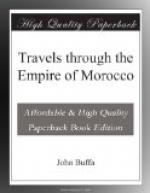On my way hither, I was highly entertained by the Serjeant of the guard. This man had not long returned from Mecca and Upper Egypt. He spoke Italian tolerably well, was full of strange notions, and considered himself quite a superior genius. He told me, that he expected to be promoted in a very short time, and asked me, whether I were present at his public entry into the garrison of Larache, on his return from the sanctuary of Mecca. I smiled, and answered him in the affirmative. He asked me, why I smiled? “At the novelty of the exhibition,” I replied, “in carrying you to all the mosques, and afterwards in escorting you in state to your humble habitation.”—“It is but too often the practice,” rejoined he, “of petulant infidels to ridicule us, in the exercise of pious customs and religious duties.” Then spurring his horse, he muttered something abusive, which I pretended not to hear. However, I found no great difficulty in appeasing the pious and sanctified serjeant. In short, I dispelled all his glooms and ill humours, and drowned his scruples, in a cup of port wine. It is customary among the Moors, when any of them return from the pilgrimage of Mecca, to go out in great procession to meet the devout pilgrim, whom some of them carry on their shoulders with great solemnity through the town and to his own house, where he sits in state for three days, receiving visits and donations from all classes of people, who flock with the greatest eagerness to obtain a sight of him. The conversation was insensibly renewed, and he told me, that of a company of fifteen pilgrims, who set out for the holy city of Mecca, he was the sole survivor, the others having all perished in the deserts. He was the only favoured and true believer that was permitted to visit the holy sepulchre. He added: “As the dangers attending the pilgrimage are great and various, does not the happy being, who returns safe to his native place, deserve the honours and compliments paid him, for his great perseverance and patience in such a dangerous undertaking, the success of which is the result of his innate rectitude?” I gave him to understand that he had made the case clear. “The French,” he continued, “had a design upon the treasures of Mecca.” I agreed that they certainly had; and asked him, by what power he thought the French army was prevented from possessing itself of Mecca. “Unquestionably,” rejoined he, “by the invincible and invisible power of our Prophet.” In reply to my intimation that it was the British arms which defeated the French before Acre and Alexandria, and compelled them to give up the conquest they had made in Egypt, he went on to say, that “all the great acts of mankind are guided and governed by a supernatural power. The French were defeated by the English, because the latter fought under the invincible standard of Mahomet; and so fully convinced are the true believers of this, that we now consider the English as brethren. I hate the French mortally; they are a set of bloody




